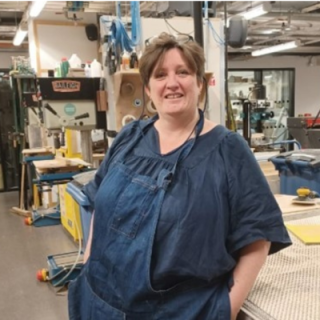General Workshop & Laboratory Services - Grade 8 (Specialist Pathway)
Example job roles: Senior Technical Specialist, Senior AIT Technician
Level: Advanced
Experiences
Activities and responsibilities likely to be required when working at this level
Health & Safety responsibilities
- Advise and oversee all equipment purchases relevant to the specialism ensuring compliance and alignment to facility priorities
- Plan and oversee all maintenance and repair activities including the completion of in-house, highly skilled repairs and maintenance
- Ensure that all equipment linked to the specialism is appropriately maintained
- Lead investigations into new equipment purchases/modifications
- Hold specific safety responsibilities relevant to the specialism e.g. laser safety officer
- Ensure all safety paperwork relevant to the specialism is completed/reviewed
- Oversee completion of all compliance tasks related to the specialist area
- Complete accident reporting and assist with investigations
- Maintain in-depth and up-to-date health and safety knowledge relevant to the specialism
- Maintain relevant up-to-date health and safety knowledge providing expert support/advice
Core responsibilities
- Provide direct line-management support, schedule, prioritise and monitor work and performance in line with demands and deadlines
- Supervise other staff and students working within the specialism
- Work collaboratively with other areas of the University to achieve efficiency and elimination of duplicated effort
- Organise and facilitate meetings as necessary and attend and present at School/Department meetings and forums
- Lead the introduction and development of new and cutting-edge equipment and techniques
- Contribute to / support local change
- Manage budgets relating to the specialism, monitoring resource usage
- Source and negotiate with suppliers for a range of items including specialist parts/equipment
- Contribute data to influence budget setting processes
- Hold overall responsibility for ensuring that the specialist area delivers against the needs of teaching and research, and that all assets relating to the specialism are utilised
- Provide highly skilled and highly-specialised teaching, research and taught course support. This will include the development of new techniques or new practical class activities to students and staff at all levels
- Ensure that the management of facilities relating to the specialism is robust and compliant
- Assess, develop and implement training and development arrangements relating to the specialism
- Contribute to the design of technical projects to enable the development of unique prototype scientific apparatus. This may include the manufacture of quality assured components and the dimensioned drawings of the specialised tolerance standards etc.
- Contribute to the design of mechanical components would include detailed Finite Element Analysis and material specification required for critical applications
- Maintain in-depth specialist knowledge, sharing with others e.g. presenting at conferences
- Mentor/coach junior staff
- Assist with the recruitment of new staff
- Ensure invoices and internal transfers are processed correctly
Personal and professional development
Development options to consider when working towards this level
Learning on the job
- Provide short term cover during periods of annual leave, for senior management
- Provide consultancy with internal and external stakeholders
- Develop and deliver training sessions for staff
- Review grant funding applications and publications
- Edit academic papers
- Co-develop specialised equipment and device with leading manufacturers
- Take a leading role in a small project, building scientific apparatus (working with others),
- Designing parts and sending them to contractors,
- Developing processes and techniques
Learning from others
- Work shadow other team members in their area of responsibility
- Seek out secondment opportunities
- Access mentoring support from a colleague or local mentoring scheme
- Attend and present at relevant conferences
- Participate in boards and international committees
Formal learning
- Accreditation/certification from a recognised professional body
- Specialised training related to the specific area
- UCL Leadership and management programmes
- Apply for training through a mid-career apprenticeship programme
Transferable skills and competencies
UCL uses the Universal Competency Framework (UCF) to discuss transferable skills. Find out more details on the framework.
Deciding and initiating action
- Making decisions
- Taking responsibility
- Acting with Confidenc.
- Acting on own initiative
- Taking action
- Taking calculated risks
Adapting and responding to change
- Adapting
- Accepting new ideas
- Adapting interpersonal style
- Showing cross-cultural awareness
- Dealing with ambiguity
Leading and supervising
- Providing direction and co-ordinating action
- Supervising and monitoring behaviour
- Coaching
- Delegating
- Empowering staff
- Motivating others
- Developing staff
- Identifying and recruiting talent
UCL Ways of Working
These describe expected behaviours in line with UCL culture and values. For Ways of Working indicators and steps to development please refer to the Ways of Working website.
4 January 2024
“Career Pathway roles are indicative and are not intended to be a description of the role in terms of responsibilty and duties.
Job family
Find out more about the General Workshop & Laboratory Services job family.
Other General Workshop & Laboratory Services profiles:
Print versions
Career Case Studies
Progression can lead to these type of General Workshop and Laboratory Services roles.

Niamh Grace
Workshop Manager, The Bartlett Manufacturing and Design Exchange (B-made)
 Close
Close

